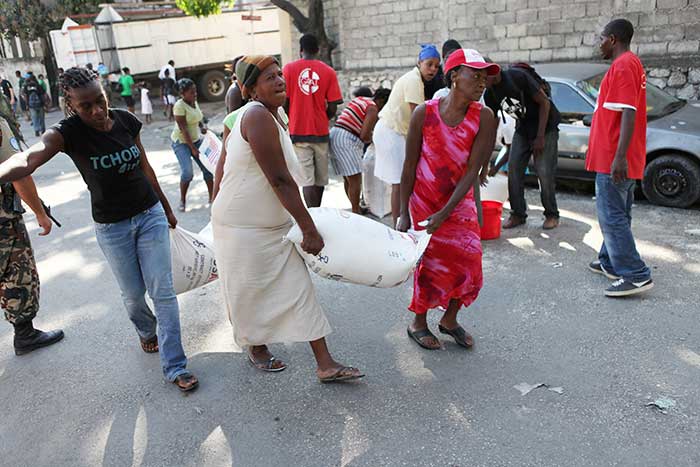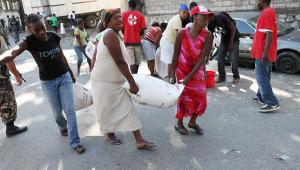p25-feature-usaid-haiti-istock_17024445_large.jpg

Haitians carry aid following the devastating earthquake that struck the country in 2010.
The storm struck the tiny nation last week, with winds exceeding over 157 miles per hour at its peak. Matthew also hit Cuba, elsewhere in the Caribbean and the US. In total nearly 900 people throughout the region have died.
In Haiti, the UN said 90% of livelihoods have been destroyed. Homes, businesses, infrastructure and crops have been levelled, cities are flooded and concerns about a surge in cholera cases and malnutrition are rife.
Haiti’s interim president, Jecelerme Privert, warned today that the nation is at risk of “real famine” following the “apocalyptic destruction” the storm left behind.
United Nations secretary general Ban Ki-Moon called today for a “massive response” from the international community.
“Hundreds have died. At least 1.4 million people need assistance at this time. Some towns and villages have almost been wiped off the map,” he said as he launched the so-called ‘flash appeal’ at the UN in New York yesterday.
The UN, as well as the UK, EU and US are among those that have already announced millions in support for the country.
But the scale of destruction and the human cost Matthew has wreaked on Haiti means recovery costs are going to be multi-billion dollar.
Damien Berrendorf, Oxfam’s director in Haiti, highlighted that Haitian citizens will need significantly more support to recover their livelihoods or even reach “minimum survival conditions”.
“We are talking about extremely vulnerable people who have lost absolutely everything. Our greatest fear is that loss of crops and possible spread of cholera and other diseases will cause more deaths than the actual hurricane over the next days and weeks,” he said.
Oxfam urged donors to act immediately and speed up the provision of aid to those affected.
“Damage wrought by Hurricane Matthew to roads and power lines in some areas is of the same magnitude to those suffered after the 2010 earthquake. It is important that the big donors start to work as soon as possible,” said Berrendorf.













